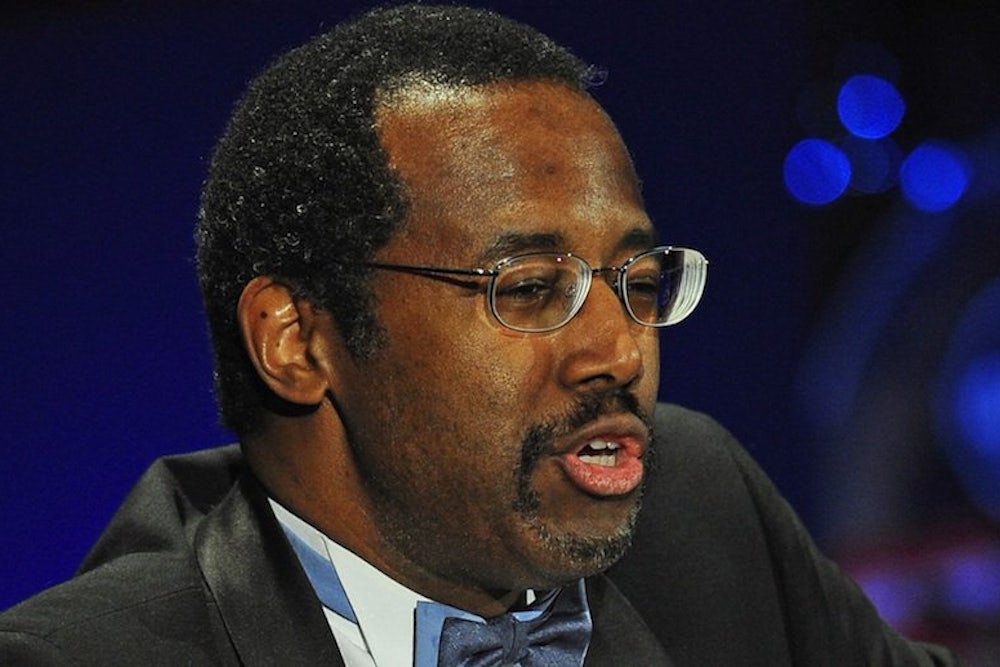Dr. Ben Carson, the famed neurosurgeon and overnight GOP star, wasn't known to most people at Johns Hopkins University, where he has worked for more than two decades, as an outspoken social conservative. But after telling Sean Hannity last week that no group should be able to redefine marriage, "be they gays, be they NAMBLA, be they people who believe in bestiality," he is now.
The media reaction to Carson's comments was predictably harsh. Business Insider called him "not just some fringy zealot," but a fringy zealot who was a reminder of "the danger Republicans face when they fall in love with a 'candidate' who has yet to be vetted by a single voter." But at Hopkins, there is outrage and confusion.
"I was shocked," said Justin McArthur, the director of the Department of Neurosurgery at JHU. "I never heard him say anything like this. I never heard him imply anything like this." McArthur, who has worked with Carson for twenty-five years, wrote him a letter after the Hannity interview. "I told him that I respected him," McArthur says, "and that I was … shocked by the remarks he made, and that I felt that while he'd made a TV apology for the remarks, he owed the Hopkins community an apology." (Carson did, in fact, apologize in the Baltimore Sun for his "choice of words" while maintaining "no group of individuals, whoever they are, whatever their belief systems, gets to change traditional definitions.")
"What do you do when arguably one of most famous doctors at Hopkins—and he's done a lot of good—has gone and done something like this?" asked John Krakauer, director of the Center for the Study of Motor Learning and Brain Repair at Hopkins and one of Carson's strongest critics on the medical campus. "It's still OK, when it comes to the gay issue, to hide behind your religion, but I’m hoping that this is the moment where that changes. … If I were a faculty member who said I don't think women should be in leadership positions, I don't think I would be around much longer."
Krakauer said he doesn't necessarily think Carson should be fired. In any case, Carson won't in fact be around much longer: He plans to retire at the end of this academic year. Until then, however, Carson remains a colleague—a special one at that. Long before he was a right-wing darling, he became famous for leading the first operation that successfully separated of conjoined twins in an operation lasting 22 hours. He used his fame to become a philanthropist and advocate for the urban poor.
His recent comments upset the student community at Hopkins, as well. A majority of graduating Hopkins medical students—more than 700 of them—have signed a petition to disinvite Carson as their commencement speaker (a student organizer said none of the organizing team would speak about Carson for the record). The university has only said that it stands by the invitation for Carson to speak at the medical school's graduation ceremony, and that the talented surgeon's views on social policy are "just that, his own."
"Carson has been a huge part of this university for such a long time, I can see how people wouldn't want to speak out," said Jeb King, a director in the university's Professional Development Office. "But his comments were so incendiary, I don't see how people can't respond to that."
Some are beginning to. The New York Times reported last month that Carson's preferred health care policy "would eliminate Medicaid and Medicare, and for the poor, government would make the contributions to their health accounts." "He’s a wonderful, wonderful person and a very warm man. But I'm not sure what he knows about health policy," said Jonathan Zenilman, the chief of Infectious Diseases at the Hopkins School of Medicine. "Being a pediatric neurosurgeon, you're not dealing with adults with chronic diseases who can't get insurance. … I think it would be safe to say that Dr. Carson's view is not shared by the vast majority of Hopkins' medical staff."
Update: On Friday afternoon, Paul B. Rothman, the dean of the Medical Faculty, sent an email to students and faculty at JHU. It read, in part, "Dr. Carson’s comments are inconsistent with the culture of our institution. Johns Hopkins Medicine embraces diversity and believes that the same civil rights should be available to all regardless of race, religion, gender or sexual orientation."
